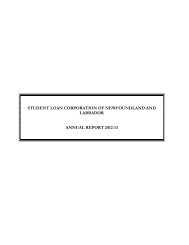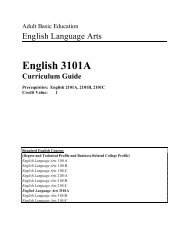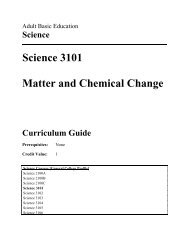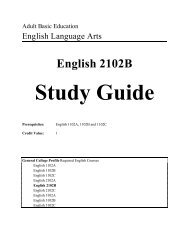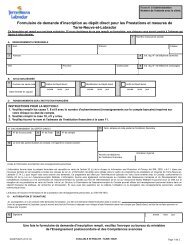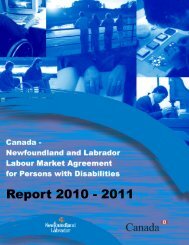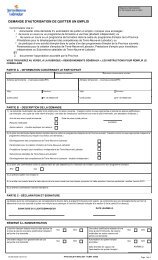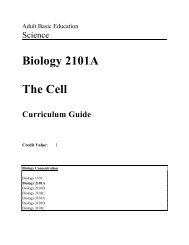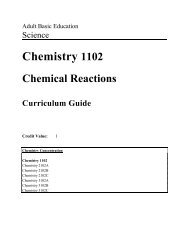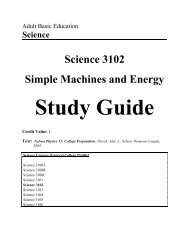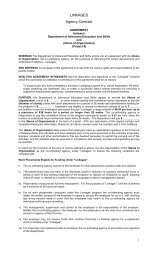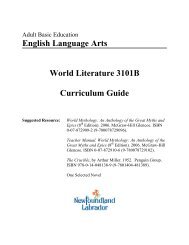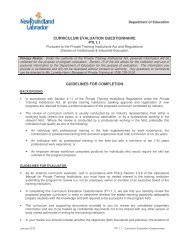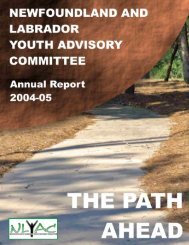- Page 1: Adult Basic Education Level III Pro
- Page 4 and 5: MATHEMATICS Introduction...........
- Page 7 and 8: FOREWORD ABE Level III Curriculum B
- Page 9: Basic Education program. In October
- Page 12 and 13: Chairperson: Roberta Yetman, ABE, A
- Page 14 and 15: Mathematics Chairperson: Cyril Orga
- Page 16 and 17: ABE Framework The revised ABE progr
- Page 18 and 19: USING THIS GUIDE ABE Level III Curr
- Page 20: encompasses and integrates the form
- Page 25 and 26: Level III Communication Skills Intr
- Page 27 and 28: IC 3211 Basic Grammar Recommendatio
- Page 29 and 30: 12. Phrases 12.1 Identify and use k
- Page 31: IC 3112 Writing Skills Recommendati
- Page 35 and 36: IC 3214 A/B Oral Communications Rec
- Page 37: Potential Resources Please refer to
- Page 40 and 41: 5. Further Writing 5.1 Write final
- Page 42 and 43: Potential Resources Please refer to
- Page 44 and 45: 5. Technical Writing 5.1 Explain im
- Page 47 and 48: IC 3218 A/B Introduction to Literat
- Page 49 and 50: Potential Resources Please refer to
- Page 51 and 52: 4.3 Examine literary devices used i
- Page 53 and 54: 3.3 Interpret themes of these selec
- Page 56 and 57: IC 3321 Optional Literature Recomme
- Page 58: Potential Resources Please refer to
- Page 61 and 62: Better Business Writing (Revised Ed
- Page 63 and 64: Landings: Newfoundland and Labrador
- Page 65 and 66: Teaching Guide: 0590314548 Printmas
- Page 68: Employability Skills
- Page 72 and 73: IE 3211 Consumer Studies 1. Consume
- Page 74 and 75: IE 3212 Computer Studies Recommenda
- Page 76: 7.8 Sort records in database. 7.9 E
- Page 79 and 80: 4.1 List steps in making decisions.
- Page 81 and 82: Films and videos: Career Support Se
- Page 83 and 84:
3.4 Apply listening skills (eg. fol
- Page 85 and 86:
National Film Board You're Eating F
- Page 87 and 88:
teacher's guide as follows: Career
- Page 89 and 90:
Small inexpensive booklet prepared
- Page 91 and 92:
Distributing Centre. Small inexpens
- Page 94:
General Options
- Page 97 and 98:
IG 3211 Newfoundland and Labrador C
- Page 99:
Potential Resources Please refer to
- Page 102 and 103:
Potential References Please refer t
- Page 104 and 105:
Potential Resources Please refer to
- Page 106 and 107:
5.1 Report upon a contemporary issu
- Page 108 and 109:
5.5 Describe use of new and unusual
- Page 110 and 111:
4 short films about women recoverin
- Page 112 and 113:
4. Women in the Workforce 4.1 Descr
- Page 114 and 115:
VHS 193 013 Working Mothers Series
- Page 116 and 117:
5.1 Summarize plan for recovery fol
- Page 119 and 120:
IG 3119 Canadian Law 1. Meaning, Fu
- Page 121 and 122:
IG 3120 Democracy 1. Basic Concepts
- Page 123 and 124:
IG 3221 Human Geography 1. Basic Ge
- Page 125:
Potential Resources Please refer to
- Page 128 and 129:
teacher's guide as follows: Career
- Page 130 and 131:
Small inexpensive booklet prepared
- Page 132 and 133:
Distributing Centre. Small inexpens
- Page 135:
Mathematics
- Page 138 and 139:
Gopher features an On-Line Educatio
- Page 140 and 141:
Algebra I Algebra II Algebra III Al
- Page 143 and 144:
IM 3101 Algebra Readiness Recommend
- Page 145:
IM 3102 Geometry Readiness Recommen
- Page 148 and 149:
Potential Resources Please refer to
- Page 150 and 151:
Please refer to the annotated bibli
- Page 152 and 153:
Potential Resources Please refer to
- Page 155 and 156:
IM 3207 Business Mathematics II 1.
- Page 157 and 158:
IM 3208 Statistics 1. Initial Conce
- Page 159 and 160:
IM 3109 Algebra I 1. Real Number Sy
- Page 161 and 162:
IM 3210 Algebra II 1. Linear Senten
- Page 163 and 164:
IM 3211 Algebra III 1. Functions 1.
- Page 165 and 166:
IM 3212 Algebra IV 1. Conic Section
- Page 167 and 168:
IM 3213 Algebra V 1. Polynomial Fun
- Page 169 and 170:
IM 3114 Geometry I 1. Parallel Line
- Page 171 and 172:
IM 3115 Geometry II 1. Similarity 1
- Page 173 and 174:
IM 3216 Trigonometry 1. Trigonometr
- Page 175 and 176:
IM 3217 Advanced Algebra I 1. Real
- Page 177 and 178:
IM 3218 Advanced Algebra II 1. Syst
- Page 179 and 180:
IM 3219 Advanced Algebra III 1. Pol
- Page 181:
Potential Resources Please refer to
- Page 184 and 185:
5. Parallelograms and Trapezoids 5.
- Page 186 and 187:
proofs and determining length of va
- Page 188 and 189:
Potential Resources Please refer to
- Page 190 and 191:
Covers objectives for both options
- Page 192 and 193:
following text: College Algebra and
- Page 195:
Science
- Page 198 and 199:
IH 3120 Electrochemistry Physics IP
- Page 200 and 201:
6. Biological Organization of Livin
- Page 202 and 203:
(circulatory) system for one exampl
- Page 205 and 206:
IB 3113 Ecology 1. Biosphere 1.1 De
- Page 207 and 208:
IB 3214 Genetics 1. Meiosis 1.1 Out
- Page 209 and 210:
IB 3115 Evolution 1. Darwin-Wallace
- Page 211 and 212:
IB 3316 Human Systems 1. Skeleto-mu
- Page 213:
Potential Resources Please refer to
- Page 216 and 217:
3.10 Draw Bohr energy level diagram
- Page 218 and 219:
3. Names, Formulas, and Properties
- Page 220 and 221:
Potential Resources Please refer to
- Page 222 and 223:
4. Stoichiometric Calculations and
- Page 224 and 225:
3. Property Differences of Matter i
- Page 227 and 228:
IH 3116 Solution Chemistry Prerequi
- Page 229 and 230:
IH 3117 Rates, Reaction, and Equili
- Page 231 and 232:
IH 3118 Acids and Bases Prerequisit
- Page 233 and 234:
IH 3119 Organic Chemistry (Optional
- Page 235 and 236:
IH 3120 Electrochemistry (Optional)
- Page 237 and 238:
IP 3111 Electricity I 1. Static Ele
- Page 239 and 240:
IP 3112 Electricity II 1. Electrica
- Page 241 and 242:
IP 3213 Waves 1. Properties of Wave
- Page 243:
Please refer to the annotated bibli
- Page 246 and 247:
4.6 Draw graph of temperature versu
- Page 249 and 250:
IP 3215 Mechanics I 1. Motion 1.1 D
- Page 251 and 252:
IP 3216 Mechanics II 1. Newton's La
- Page 253:
Potential Resources Please refer to
- Page 256 and 257:
5. Relationship Between Oceans and
- Page 259 and 260:
IS 3212 Geology 1. Rocks and Minera
- Page 261:
Potential Resources Please refer to
- Page 264 and 265:
3. Compounds and Chemical Reactions
- Page 267 and 268:
IS 3214 Environmental Science 1. Ba
- Page 269:
Potential Resources Please refer to
- Page 272 and 273:
4. Building Blocks of Life 4.1 Defi
- Page 274 and 275:
Potential Resources Please refer to
- Page 276 and 277:
The Biosphere. Thomas Stephen & Dav
- Page 278 and 279:
Focus on Earth Science. Dale T. Hes
- Page 280 and 281:
Brace & Company. Used in school sys
- Page 282 and 283:
Publishers and Suppliers ACCESS Net
- Page 284 and 285:
Copp Clark Pitman Limited 2775 Math
- Page 286 and 287:
D. C. Heath Canada Ltd. 100 Adelaid
- Page 288 and 289:
L7G 4X6 Charles E. Merrill carried
- Page 290 and 291:
Toronto, Ontario M7A 1N8 Telephone:
- Page 292 and 293:
Government Departments and Other Ag
- Page 294 and 295:
Newfoundland Lung Association P.O.
- Page 297:
APPENDIX A Graduation Requirements
- Page 301:
APPENDIX B Ongoing Changes ABE to H
- Page 305 and 306:
APPENDIX C Student Waiver Form Stud
- Page 308:
Appendix D
- Page 312:
ABE LEVEL III COURSE COMPARISON MAT
- Page 316 and 317:
ABE LEVEL III GENERAL OPTIONS COURS
- Page 318 and 319:
ABE LEVEL III SCIENCE COURSE COMPAR
- Page 320 and 321:
ABE LEVEL III SCIENCE COURSE COMPAR
- Page 322 and 323:
ABE LEVEL III MATHEMATICS COURSE CO
- Page 324:
Revised October 1995Page 10



